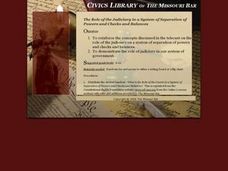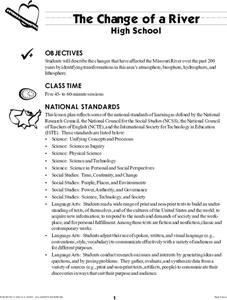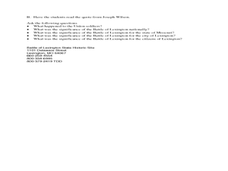Curated OER
The Missouri Compromise of 1820
Students use a map of the Missouri Compromise to explain the geographical changes it brought to the U.S. and why the changes provoked a debate over the expansion of slavery in the U.S.
Curated OER
The Powers of National and State Government
Students define term federalism, identify the powers granted to state and national government, and identify powers shared by the state and national governments.
Curated OER
An Early Threat of Secession: The Missouri Compromise of 1820 and the Nullification Crisis
High schoolers examine the controversies over slavery's expansion and how the federal tariffs further entrenched the dividing line between northern and southern interests.
Curated OER
Is Government Necessary?
Students investigate the purpose of Congress and determine how it affects them. They explain what life would be like without government.
Curated OER
An Early Threat of Secession: The Missouri Compromise of 1820 and the Nullification Crisis
Students analyze an interactive map of the Missouri Compromise to identify the regions and their relation to slavery. In this pre-civil war era lesson, students read primary source documents and research online to answer questions...
Curated OER
Government: Missouri Bar Civics Library
Students visit the Missouri bar Website to examine information about the U.S. Constitution and its Amendments. They complete a variety of activities from the provided lessons including the judiciary, Fourth Amendment issues, civil law,...
Judicial Learning Center
Your 4th Amendment Rights
Americans love to learn about their rights, especially those that protect them from the government's power to invade their privacy. Young people are especially engaged by this topic. An informative lesson explores four Supreme Court...
Curated OER
The Kansas-Nebraska Act of 1854: Popular Sovereignty and the Political Polarization over Slavery
Why did Stephen Douglas support the Kansas-Nebraska Act of 1854? Why did Abraham Lincoln oppose it? Young historians examine how the Kansas-Nebraska Act of 1854 affected the political balance between free and slave states and explore how...
Curated OER
Members of Congress Who Have Made a Significant Contribution
Learners examine laws that have benefited the nation in a variety of ways. The congressperson in the legislative branch of the government primarily responsible for the passage of the law and the current representatives are sought in this...
Curated OER
A House Dividing: The Growing Crisis of Sectionalism in Antebellum America
Learners explore the debates over American slavery and the power of the American federal government for the first half of the 19th century and how the regional economies and political events produced a widening split between the states.
Curated OER
The Role of the Media
Students participate in class discussion to investigate how media affects the ideas of Americans (specifically in politics) and then research events in political history to analyze how the media may have influenced the government's...
Curated OER
Paying for Government Services
Learners identify major sources of revenue for government spending and identify the type of tax that makes up the largest percentage of the federal budget. They are introduced to the major services provided by local, state and national...
Curated OER
Little House in the Census: Almanzo and Laura Ingalls Wilder
How would you use census data from 1880-1900? Here are a set of ways you can incorporate the book Little House on the Prairie and US census data from that time period. Learners will research the validity or the book based on factual...
Curated OER
Right to vote...in the wrong place
Students create a presentation for other class members or for a local citizens' group explaining how they can guard ensure voter rights. Students research the Ohio Secretary of State's stand on provisional voting rules.
Curated OER
The Change of a River
Students explore changes in the Missouri River. For this Missouri River lesson, students discover that changes in the atmosphere cause changes in the river. Students search the Internet for information about the Missouri River and its...
Curated OER
The Change of a River
Students describe the changes that have affected the Missouri River over the past 200 years by identifying transformations in this area's atmosphere, biosphere, hydrosphere, and lithosphere. They research online in groups assigned to...
Curated OER
Life before Congress
Students name some interesting backgrounds of Members of Congress, identify their current representatives in the legislative branch of the national government, and describe the background of one local representative or senator.
Curated OER
The Battle of Lexington
Young scholars discover the Missouri River and its importance during the Civil War. In this U.S. history instructional activity, students examine a map of the great Battle of Lexington, and discuss why the Missouri River was a key...
Curated OER
A House Dividing: The Growing Crisis of Sectionalism in Antebellum America
Young scholars trace the development of sectionalism in the United States. They explore slavery, freedom and the Constitution. Students identify influential opponents and defenders of American slavery. They explain different solutions...
Alabama Learning Exchange
Newscast on the Battles of the Ironclad Ships
Fifth graders create multi-media newscasts based on their knowledge of Civil War battles of the ironclad ships.
Curated OER
Why Does Congress Work That Way?
Learners discover the powers of Congress. In this legislative branch lesson, students examine the legislative process as they analyze Article I of the U.S. Constitution. Learners consider the powers of Congress as they define the role of...
Curated OER
Local Mobilization for War
Tenth graders analyze how government policies led to complete concentration in war effort, evaluate how patriotism was encouraged by many local and state groups, and discuss fate of Japanese Americans.
Curated OER
Elections for Elementary Students
Students explore various websites that explain how primaries, caucuses, and general elections function. They view sample ballots, and analyze the executive branch, U.S. presidents, and citizenship.
PBS
African-Americans in the American West
Secondary learners explore the westward movement of African Americans. Segmented into four time periods, the lesson provides an overview of how African Americans experienced westward expansion. Learners view PBS specials on the...

























